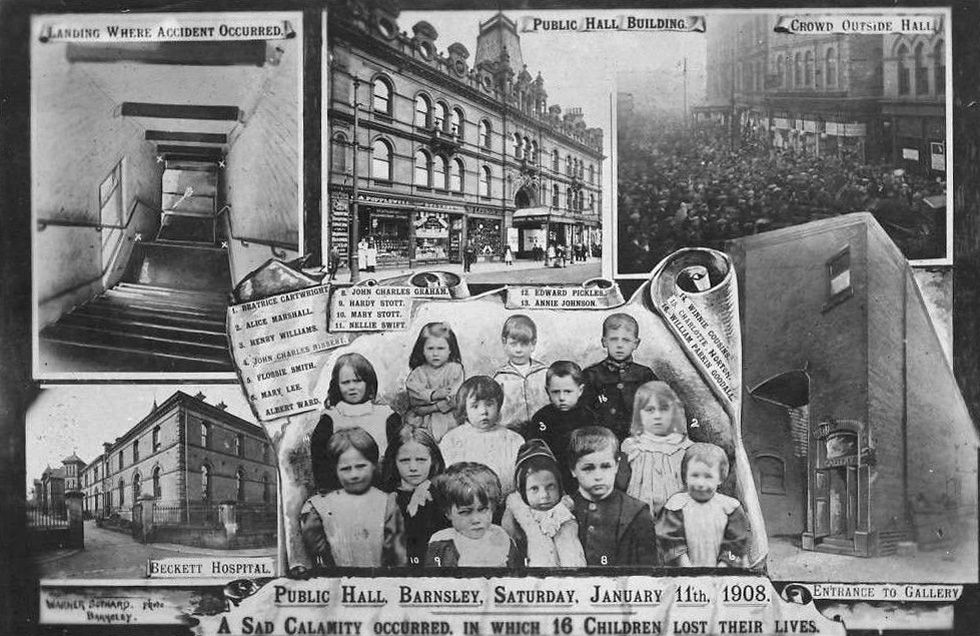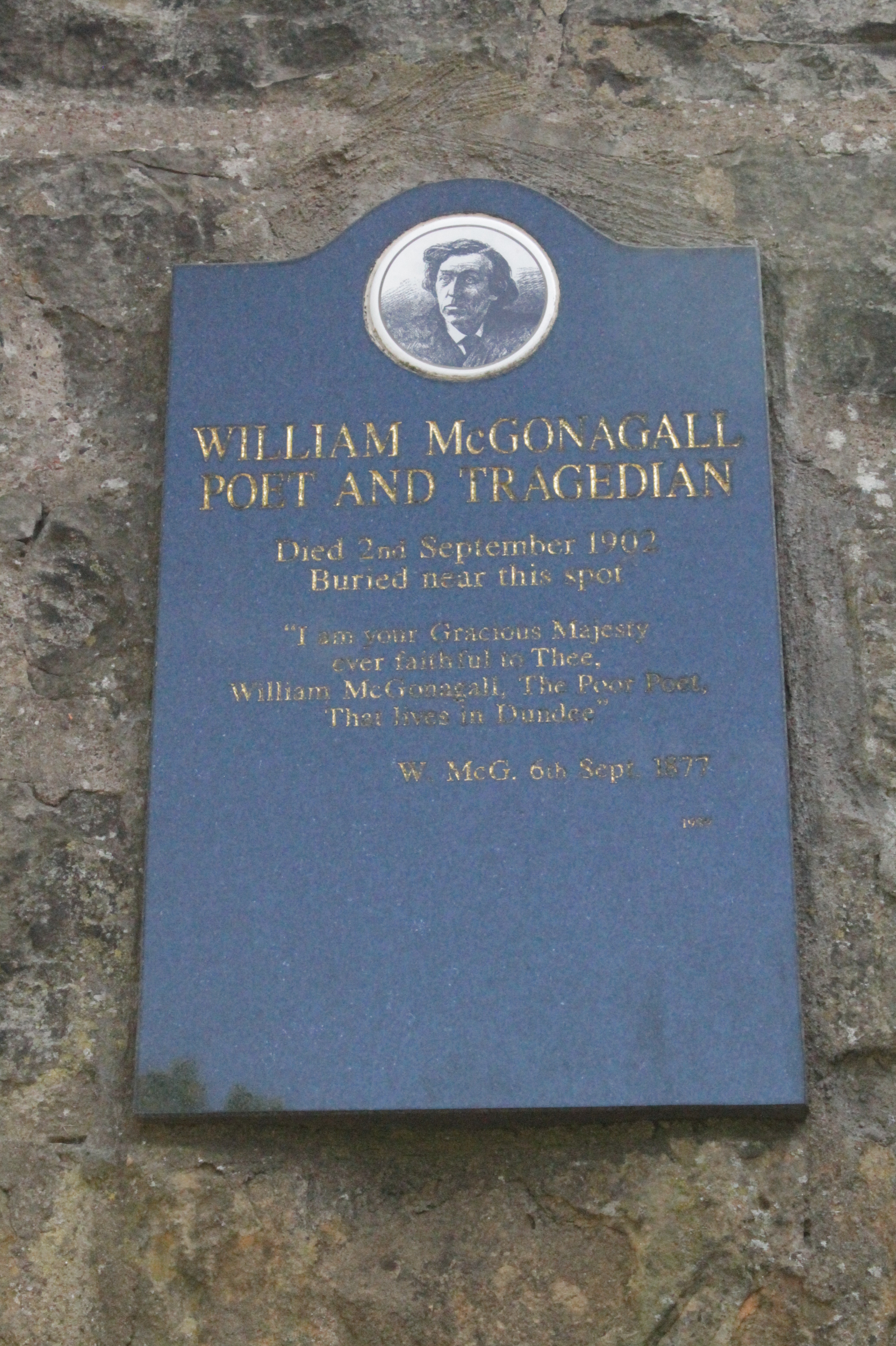|
Victoria Hall Disaster
The Victoria Hall disaster occurred on 16 June 1883 at the Victoria Hall in Sunderland, England, when the distribution of free toys caused a crowd crush resulting in 183 children (aged between 3 and 14 years old) to be crushed to death due to compressive asphyxia. Events On 16 June 1883, a children's variety show was presented by travelling entertainers Mr. and Mrs. Fay. The travelling magic show, consisting of a variety of conjuring tricks and illusions, passed without incident, except when a puff of smoke from one of the tricks "disagreed" with some of those in the front row, and caused a few children to be sick. At the show's end, an announcement was made that children with certain numbered tickets would be presented with a prize upon exit. At the same time, entertainers began distributing gifts from the stage to the children in the stalls. Worried about missing out on the treats, many of the estimated 1,100 children in the gallery surged toward the staircase leading do ... [...More Info...] [...Related Items...] OR: [Wikipedia] [Google] [Baidu] |
Bishopwearmouth Cemetery
Bishopwearmouth Cemetery is a cemetery in Sunderland, Tyne and Wear, England. It lies between Hylton Road and Chester Road ( A183 road). History Due to the cholera epidemic of 1831 and the subsequent overcrowding of churchyards, it was decided to build new cemeteries in Sunderland after the passing of the Burial Act 1852 and 1853. The chosen for Bishopwearmouth Cemetery lay on the edge of the county and parliamentary boundary of Sunderland and was glebe land, owned by the Parish of Bishopwearmouth. The land was sold by the parish for £275 (£17,839.73 in 2007) per acre and the cemetery cost £2000 (£129,743.47 in 2007) to build. It opened in May 1856, on the same day as another new cemetery, Mere Knolls Cemetery, situated in Fulwell. All religious denominations were allotted separate areas and it soon became the town's main burial site. In 1891, the cemetery was extended further west and south, then further extended west in 1926. The whole site now covers . Jewish buria ... [...More Info...] [...Related Items...] OR: [Wikipedia] [Google] [Baidu] |
Disasters In England
A disaster is an event that causes serious harm to people, buildings, economies, or the environment, and the affected community cannot handle it alone. ''Natural disasters'' like avalanches, floods, earthquakes, and wildfires are caused by natural hazards. ''Human-made disasters'' like oil spills, terrorist attacks and power outages are caused by people. Nowadays, it is hard to separate natural and human-made disasters because human actions can make natural disasters worse. Climate change also affects how often disasters due to extreme weather hazards happen. Disasters usually hit people in developing countries harder than people in wealthy countries. Over 95% of deaths from disasters happen in low-income countries, and those countries lose a lot more money compared to richer countries. For example, the damage from natural disasters is 20 times greater in developing countries than in industrialized countries. This is because low-income countries often do not have well-built bui ... [...More Info...] [...Related Items...] OR: [Wikipedia] [Google] [Baidu] |
19th Century In County Durham
19 (nineteen) is the natural number following 18 and preceding 20. It is a prime number. Mathematics Nineteen is the eighth prime number. Number theory 19 forms a twin prime with 17, a cousin prime with 23, and a sexy prime with 13. 19 is the fifth central trinomial coefficient, and the maximum number of fourth powers needed to sum up to any natural number (see, Waring's problem). It is the number of compositions of 8 into distinct parts. 19 is the eighth strictly non-palindromic number in any base, following 11 and preceding 47. 19 is also the second octahedral number, after 6, and the sixth Heegner number. In the Engel expansion of pi, 19 is the seventh term following and preceding . The sum of the first terms preceding 17 is in equivalence with 19, where its prime index (8) are the two previous members in the sequence. Prime properties 19 is the seventh Mersenne prime exponent. It is the second Keith number, and more specifically the first Keith prim ... [...More Info...] [...Related Items...] OR: [Wikipedia] [Google] [Baidu] |
1883 In England
Events January * January 4 – ''Life'' magazine is founded in Los Angeles, California, United States. * January 10 – A fire at the Newhall Hotel in Milwaukee, Wisconsin, United States, kills 73 people. * January 16 – The Pendleton Civil Service Reform Act, establishing the United States civil service, is passed. * January 19 – The first electric lighting system employing overhead wires begins service in Roselle, New Jersey, United States, installed by Thomas Edison. February * February 15 – Tokyo Electrical Lightning Grid, predecessor of Tokyo Electrical Power ( TEPCO), one of the largest electrical grids in Asia and the world, is founded in Japan. * February 16 – The ''Ladies' Home Journal'' is published for the first time, in the United States. * February 23 – Alabama becomes the first U.S. state to enact an antitrust law. * February 28 – The first vaudeville theater is opened, in Boston, Massachusetts. * February &nda ... [...More Info...] [...Related Items...] OR: [Wikipedia] [Google] [Baidu] |
1880s Disasters In The United Kingdom
Year 188 (CLXXXVIII) was a leap year starting on Monday of the Julian calendar. At the time, it was known in the Roman Empire as the Year of the Consulship of Fuscianus and Silanus (or, less frequently, year 941 ''Ab urbe condita''). The denomination 188 for this year has been used since the early medieval period, when the Anno Domini calendar era became the prevalent method in Europe for naming years. Events By place Roman Empire * Publius Helvius Pertinax becomes pro-consul of Africa from 188 to 189. Japan * Queen Himiko (or Shingi Waō) begins her reign in Japan (until 248). Births * April 4 – Caracalla (or Antoninus), Roman emperor (d. 217) * Lu Ji (or Gongji), Chinese official and politician (d. 219) * Sun Shao, Chinese general of the Eastern Wu state (d. 241) Deaths * March 17 – Julian, pope and patriarch of Alexandria * Fa Zhen (or Gaoqing), Chinese scholar (b. AD 100) * Lucius Antistius Burrus, Roman politician (executed) * Ma Xiang, Chin ... [...More Info...] [...Related Items...] OR: [Wikipedia] [Google] [Baidu] |
Hillsborough Disaster
The Hillsborough disaster was a fatal crowd crush at a football match at Hillsborough Stadium in Sheffield, South Yorkshire, England, on 15 April 1989. It occurred during an FA Cup semi-final between Liverpool and Nottingham Forest in the two standing-only central pens within the Leppings Lane stand allocated to Liverpool supporters. Shortly before kick-off, police match commander David Duckenfield ordered exit gate C to be opened in an attempt to ease crowding, which led to an influx of supporters entering the pens. This resulted in overcrowding of those pens and the fatal crush; with a total of 97 fatalities and 766 injuries, the disaster is the deadliest in British sporting history. Ninety-four people died on the day; one more died in hospital days later, Tony Bland died in 1993, and in 2021, Andrew Devine, the 97th person died. Both Bland and Devine had suffered irreversible brain damage on the day. The match was abandoned and replayed at Old Trafford in Manchester on 7 ... [...More Info...] [...Related Items...] OR: [Wikipedia] [Google] [Baidu] |
Laurier Palace Theatre Fire
The Laurier Palace Theatre fire, sometimes known as the Saddest fire or the Laurier Palace Theatre crush, occurred in a movie theatre in Montreal, Montreal, Quebec, on January 9, 1927, killing 78 people. The theatre was located at 3215 Saint Catherine Street East, just east of Dézéry St. Fire The fire started in the early afternoon during a performance of the comedy ''Get 'Em Young''. Approximately 250 children were in attendance, the majority of them not accompanied by an adult. Survivors remembered the cry of fire and smoke quickly filling the air. Ushers, not realizing the danger, at first blocked the east balcony exit and urged the children to return to their seats. The exit doors opened inwards, meaning that the crush of those trying escape prevented them from being opened. The projectionist, Émile Massicotte, got thirty children away from the locked exit into the projection booth, then passed them out a window onto the marquee above the sidewalk, whence they descended ... [...More Info...] [...Related Items...] OR: [Wikipedia] [Google] [Baidu] |
Barnsley Public Hall Disaster
The Barnsley Public Hall disaster took place on Saturday 11 January 1908 in a public hall in Barnsley, West Riding of Yorkshire, England. It resulted in the deaths of sixteen children. At least 40 others were seriously injured. A number of children were entering the hall to see a show when a staircase became overcrowded, and there was a crush as they tried to get inside. The survivors were taken to Beckett Hospital. Incident The accident occurred during a penny performance for children at a public hall in Barnsley, West Riding of Yorkshire, on 11 January 1908. Children from across Barnsley had come to watch a film, walking to the public hall through falling snow. According to news reports at the time, a large number of children showed up, and the hall quickly became overcrowded. With the ground floor seats full, children packed into the gallery to such an extent that the aisles of the gallery were filled and children were pressed against the lower gallery railing. In order t ... [...More Info...] [...Related Items...] OR: [Wikipedia] [Google] [Baidu] |
William McGonagall
William McGonagall (March 1825 – 29 September 1902) was a Scottish poet and public performer. He gained notoriety as an poetaster, extremely bad poet who exhibited no recognition of, or concern for, his peers' opinions of his work. He wrote about 200 poems, including "The Tay Bridge Disaster" and "The Famous Tay Whale", which are widely regarded as some of the worst in English literature. Groups throughout Scotland engaged him to make poetry reading, recitations from his work, and contemporary descriptions of these performances indicate that many listeners were appreciating McGonagall's skill as a comic music hall character. Collections of his verse remain popular, with several volumes available today. McGonagall has been lampooned as the worst poet in British history. The chief criticisms are that he was deaf to poetic metaphor and unable to scansion, scan correctly. His only apparent understanding of poetry was his belief that it needed to rhyme. McGonagall's fame stems fro ... [...More Info...] [...Related Items...] OR: [Wikipedia] [Google] [Baidu] |





